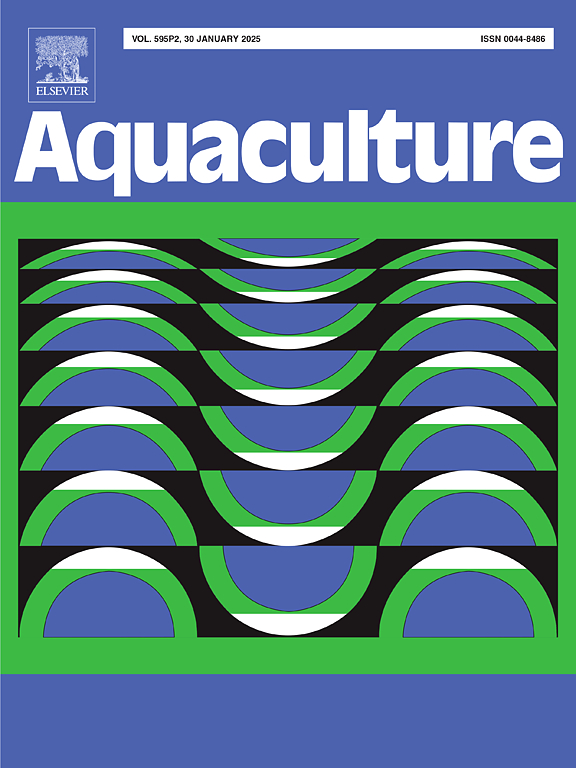Seaweed-derived biochar as a sustainable feed supplement enhances tilapia growth associated with gut microbiota modulation
IF 3.9
1区 农林科学
Q1 FISHERIES
引用次数: 0
Abstract
The escalating demand for sustainable aquaculture practices has driven interest in innovative feed supplements. This study evaluated seaweed-derived biochar (RSB) produced from Agardhiella subulate (AS) through slow pyrolysis at 400 °C, resulting in a conversion rate of 52 % and a biochar rich in organic carbon (>85 % of total carbon content) with a porous structure. We hypothesized that incorporating this biochar into tilapia (Oreochromis niloticus) feed could enhance growth performance by modulating gut microbiota composition. Over a 12-week feeding trial, tilapia were fed diets containing 0 %, 1 %, and 2 % biochar. Growth performance was assessed through measurements of weight gain, feed conversion ratio, and survival rates. High-throughput sequencing was performed to analyze gut microbiota changes. Results showed that tilapia fed the 1 % biochar-supplemented diet exhibited a significant increase in weight gain and improved feed conversion ratios. The biochar's high organic carbon content and porous structure may facilitate nutrient absorption and provide a substrate for beneficial gut bacteria. Gut microbiota analysis revealed shifts in microbial communities, with increased abundance of beneficial bacteria associated with enhanced nutrient metabolism. No adverse effects on fish health or survival were observed. The incorporation of seaweed-derived biochar with specific beneficial characteristics into tilapia feed demonstrates potential for enhancing growth performance and improving gut microbiota composition. This study supports the use of biochar as a sustainable feed supplement in aquaculture, offering economic and environmental benefits. Future research should focus on optimizing biochar properties and concentrations, and exploring long-term impacts on fish health and productivity.

海藻衍生的生物炭作为一种可持续的饲料补充,通过调节肠道微生物群,促进罗非鱼的生长
对可持续水产养殖实践不断增长的需求推动了对创新饲料补充物的兴趣。本研究对以Agardhiella subulate (AS)为原料,在400°C下缓慢热解得到的海藻衍生生物炭(RSB)进行了评价,该生物炭的转化率为52%,具有多孔结构,有机碳含量丰富(占总碳含量的85%)。我们假设将这种生物炭添加到罗非鱼饲料中可以通过调节肠道菌群组成来提高罗非鱼的生长性能。在12周的饲养试验中,分别饲喂含有0%、1%和2%生物炭的罗非鱼饲料。通过测量增重、饲料系数和存活率来评估生长性能。采用高通量测序分析肠道菌群变化。结果表明,添加1%生物炭的饲料显著提高了罗非鱼的增重和饲料系数。生物炭的高有机碳含量和多孔结构可以促进营养物质的吸收,并为有益的肠道细菌提供基质。肠道菌群分析揭示了微生物群落的变化,有益菌的丰度增加与营养代谢增强有关。没有观察到对鱼类健康或生存的不良影响。在罗非鱼饲料中加入具有特定有益特性的海藻衍生生物炭,具有提高生长性能和改善肠道菌群组成的潜力。本研究支持在水产养殖中使用生物炭作为可持续饲料补充,具有经济和环境效益。未来的研究应侧重于优化生物炭的特性和浓度,并探索对鱼类健康和生产力的长期影响。
本文章由计算机程序翻译,如有差异,请以英文原文为准。
求助全文
约1分钟内获得全文
求助全文
来源期刊

Aquaculture
农林科学-海洋与淡水生物学
CiteScore
8.60
自引率
17.80%
发文量
1246
审稿时长
56 days
期刊介绍:
Aquaculture is an international journal for the exploration, improvement and management of all freshwater and marine food resources. It publishes novel and innovative research of world-wide interest on farming of aquatic organisms, which includes finfish, mollusks, crustaceans and aquatic plants for human consumption. Research on ornamentals is not a focus of the Journal. Aquaculture only publishes papers with a clear relevance to improving aquaculture practices or a potential application.
 求助内容:
求助内容: 应助结果提醒方式:
应助结果提醒方式:


